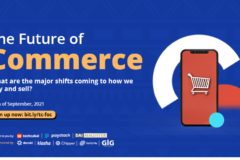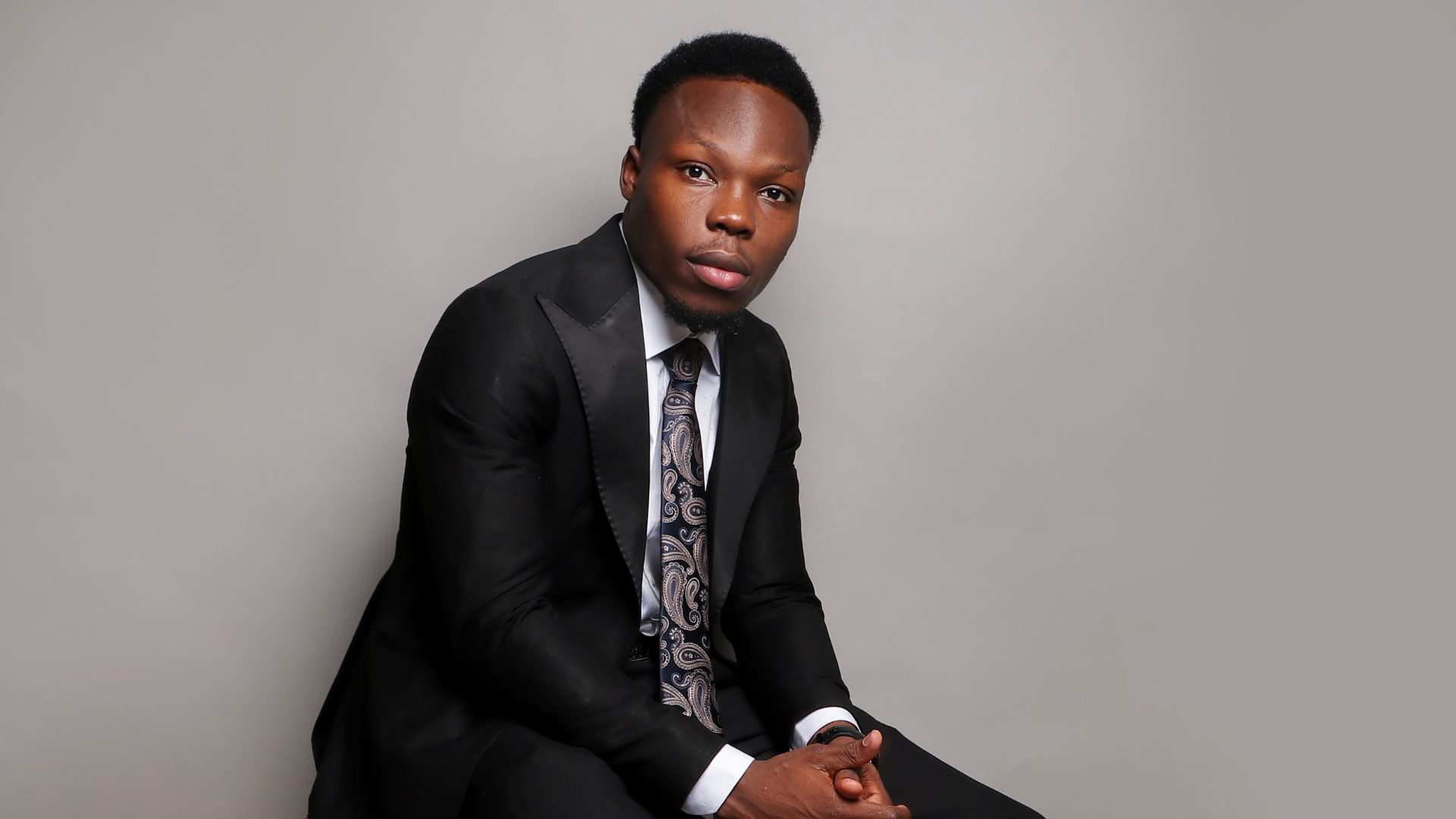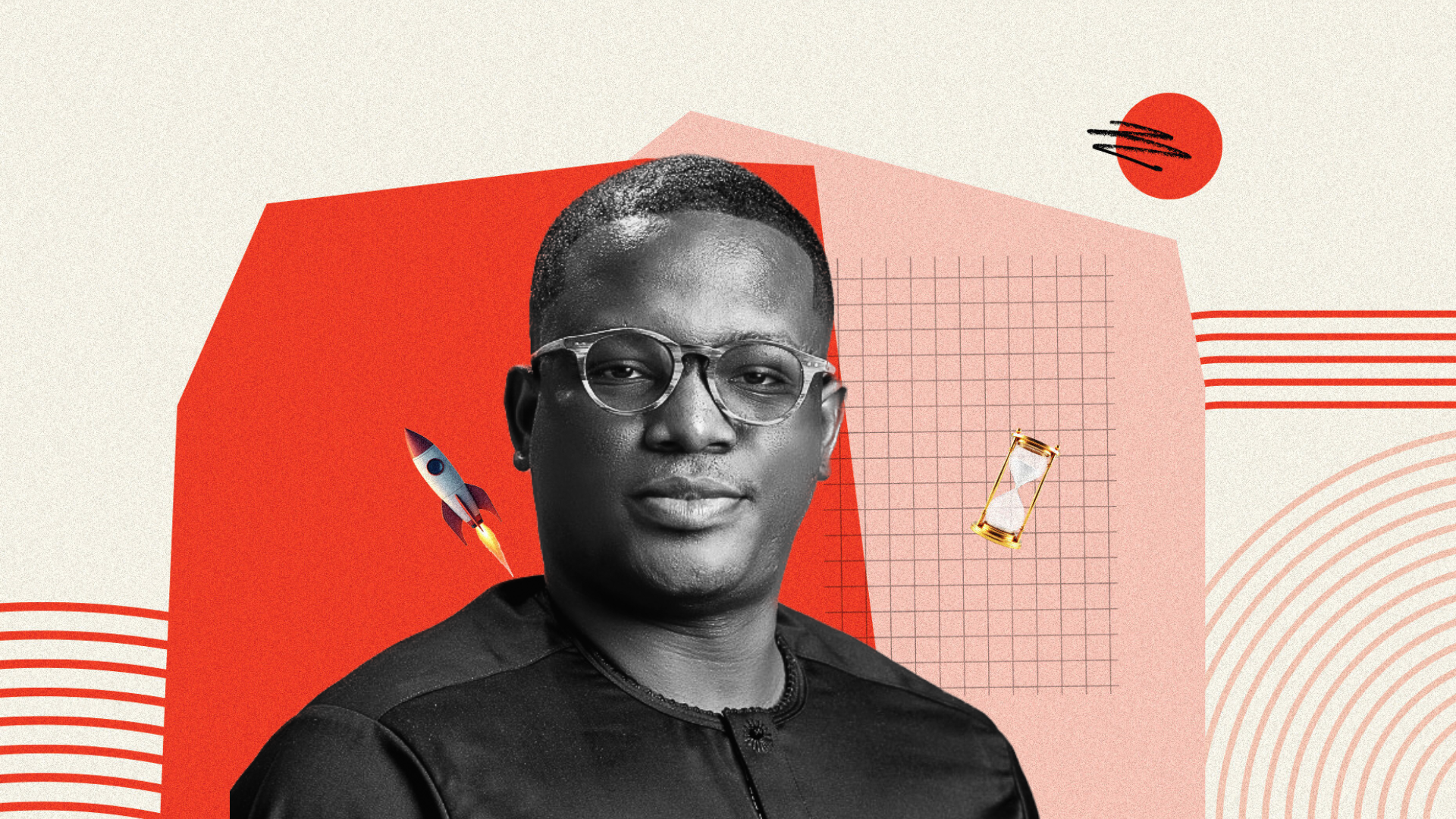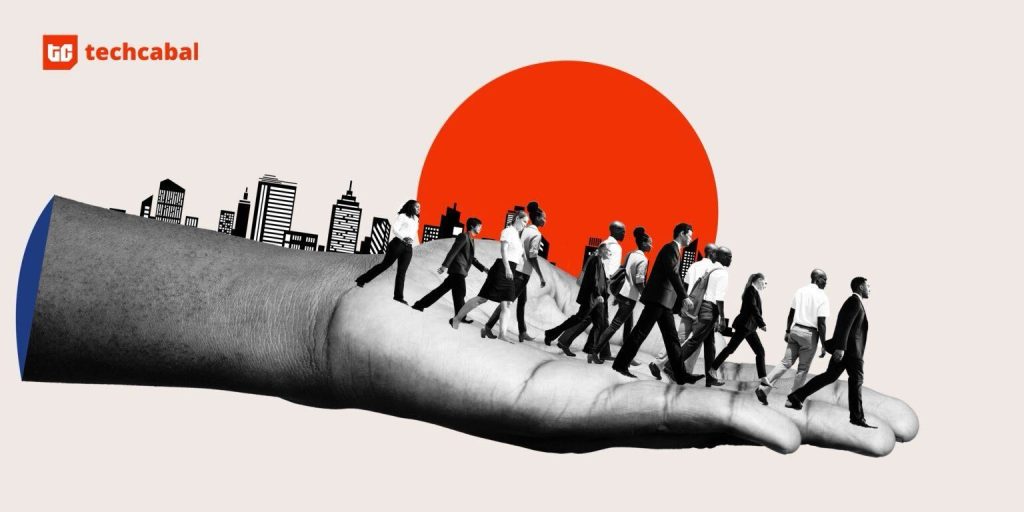Kedu Lagos
1 November 2024 – 30 November 2024
Old Government Printing Press 6 Broad Street, Lagos
Supported by:
Studio Quantum, Imisi 3d, Yemisi Shyllon Museum of Art, G.A.S. Foundation, Techcabal, Art Report
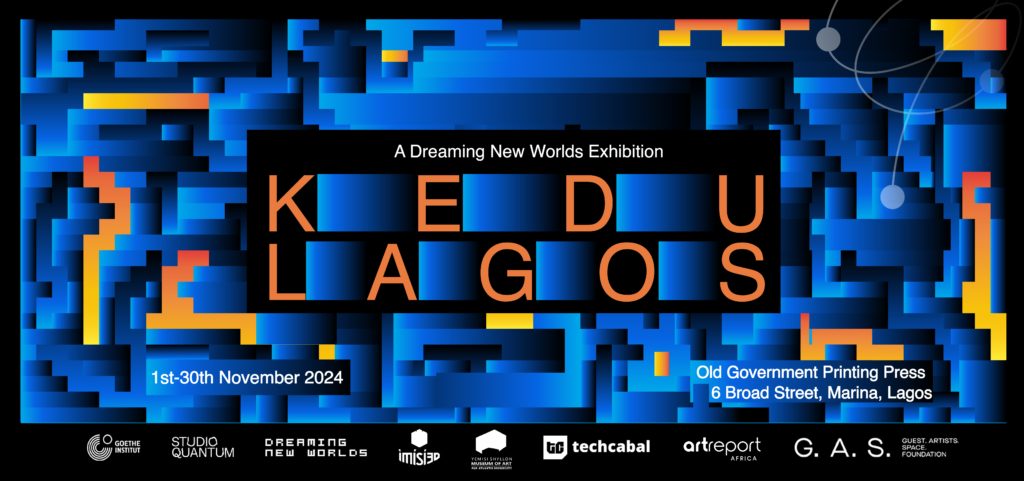
Dreaming New Worlds concludes its 2nd edition with Kedu Lagos, an exhibition by the Goethe-Institut Nigeria, curated by Chinyere Obieze. The open call back in May of 2024 prompted artists, scientists and creative technologists to pitch project ideas in response to the theme ‘Collective Illusions’. The theme aimed to push creatives to interrogate how embodied traditions manifest in today’s contexts and to explore the forces that sustain their resilience.
With the guidance of this year’s mentors Dr Odun Orimolade and Ade Adekola, and the support of the partners Studio Quantum, Imisi 3d, Yemisi Shyllon Museum of Art, G.A.S. Foundation, Techcabal and Art Report, the awarded collectives have exercised their collaborative interdisciplinary skills in dialogue between the arts and sciences. They will be showing work alongside this year’s resident Studio Quantum – another cross-regional project by the Goethe-Institut – artist Alexandra Martens Serrano.
Obieze’s Kedu Lagos nods to Chief Stephen Osita Osadebe’s 1996 highlife album, Kedu America. There, Osadebe grieves and delights in his attachment to his regrounded culture. Obieze repositions the album’s context to Lagos by employing the historic Old Government Printing Press to serve a backdrop for a nuanced exploration of Lagos’s knowledge systems in today’s digital-information-driven world.
The history of Lagos is closely tied to its economy, shaped by ongoing political, social, and cultural flows. After its annexation, the city evolved into a diverse, eclectic nexus characterized by increasing social stratification and contrasting lifestyles. Its essence cannot be acknowledged without recognizing the economic growth shaped by its colonial past. Today, this transformation drives the city’s growing wealth and influences the aspirations for modernity in the wake of Independence. The Old Printing Press stands in the hub of the once British commercial district as a relic to this past.
Kedu Lagos posits that evolutions in the city and the embodied traditions of the people are not mutually exclusive, but rather exist in a symbiotic relationship that allows for the resilience and renewal of these knowledge systems. It examines how information systems—from ancient oral traditions to modern digital platforms—function as mechanisms through which knowledge-sharing and community-building is transmitted, contested, and transformed. The exhibition proposes that while digital cultures offer new platforms for expression and dissemination, they simultaneously act as a marker of the resilience of a democratized sensibility to information dissemination in embodied cultures. This sensibility now faces a new horizon in the advent of digital cultures; and asks for a deep interrogation of how knowledge is embodied, localized, and maintained in built environments such as Lagos.
The exhibition’s immersive, participatory character, much like Osadebe’s album with hands linked on the cover, deep wisdom embedded in its Igbo sonorous lyrics, and the resonant pluck of guitars; argues against only an interpretation of content in understanding its essence. Instead, it presents itself, both in content and form, as case studies for viewers to reflect on how knowledge is embodied, localized, and sustained within interpersonal relationships, economies, and the evolving cityscape. With technology spanning quantum principles, projection mapping, 3d printing, biotech and augmented reality, this exhibition is an invitation to the visitor to open one’s perspective to the flows of one’s relations with the cultures which color the city of Lagos, and furthermore, to reflect on the gift and resilience of our individual consciousness, and the possibilities of language in our collective task of building the future.
Alexandra Martens Serrano (Studio Quantum 2024 artist in residence) in her installation titled Pidgin Choreography depicts the relationship between two entangled atoms that mirror human practices of knowledge-sharing. She takes inspiration from the sculptural constructions built around digital screens in public spaces around Nigeria. She reflects on the physical bodies that we as humans create to give shape to technology and intangible information and re-interprets these public structures as a technoscientific reference to the atom. Through the principle of quantum entanglement, the work explores how atoms remain connected regardless of distance, instantly transferring information between them.
Source Code (Ayomitunde Adeleke, Femi Fala, Nonso Neec and Ayeni Olajide): In their installation, the artists melodically negotiate with new media and memory. They present a methodological approach to expressing ambiguity by interrogating nostalgia and its material consequences in a dance of potentiality mediated by light. Using data, photography and light, they bring to dialogue the far- flung scale of memory and its function in the rhythm of Nigerian life.
Chronoverse (Olúbùnmi Atere, Olorunyemi Kolapo Obadiah, Adewale Simileoluwa Iaasc Johnson): In their installation titled Totem, the artists examine the ubiquitous rites of passage found across human societies. Focusing on the entrepreneurial system of Eastern Nigeria known as Igba boi and drawing parallels with the collective systems in Chinese society, they explore the rituals and frameworks these groups use to organize, mentor, and regulate their members. By reflecting on the material representation of Totems, Chronoverse delves into humanity’s ability to give form to life— by birth, of humans, material objects, artificial legal entities and so on. This exploration of societal structures and symbols illuminates the ways in which human communities continuously generate and sustain life, both biological and conceptual.
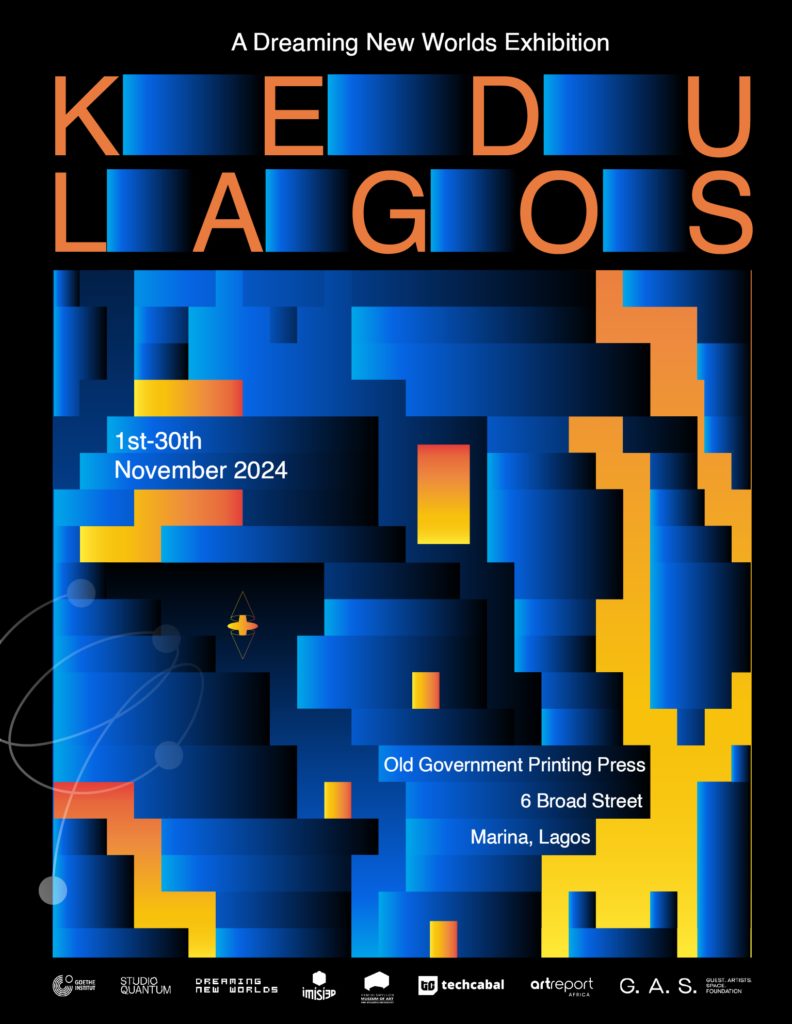
Exhibition Programming
Public Opening
Saturday November 2nd, 2024 – 5pm
Old Government Printing Press 6 Broad Street, Lagos
Digital and Contemporary Art after the NFT Boom (Panel Discussion): _Creath, Gazelli Art House, Shutabug_Online and Live stream at exhibition venue
Wednesday November 6th, 2024 – 6pm
Old Government Printing Press 6 Broad Street, Lagos
Chronicling Historic Architecture- 19th & 20th Century Architecture by Facades Nigeria
Thursday 14th November 2024 – 12pm
Old Government Printing Press 6 Broad Street, Lagos
Interactive Deign Workshop by Femi Fala
November 18th and 19th
Old Government Printing Press 6 Broad Street, Lagos
Artist Talk and Closing Party
Saturday November 30th, 2024 – 3pm
Old Government Printing Press 6 Broad Street, Lagos
Dreaming New Worlds and Kedu Lagos is a project by Goethe-Institut Nigeria, curated by Obieze Chinyere. The exhibition will run from 2nd November 2024 to 30th November 2024 at the Old Government Printing Press and is free to view.
Ade Adekola said:
Dreaming new worlds is an accelerated “lab to culture” program. It is one of the only true innovation platforms available in Nigeria. It allows creators to make “Petri dish” experiments and make them exhibition ready within a few months. It is of it’s time, promoting access to the proliferation of new digital tools and channels of pedagogic information. The program heightens the necessity for cross cultural experimentation at the convergence of art, science, and technology. Offering a ground zero for experimentation and innovation – it puts creators through an intense collaborative program that fosters critical thinking, ideation and collaboration. The program places truth seekers, myth makers and visual story tellers behind the driving wheel of their narratives. Offering them a platform for social engagement, they learn to give form to their dreams of new types and forms of cultural expression.
Dr Odun Orimolade said:
The theme of Collective Illusions serves as a rich conduit for cross-disciplinary inquiry, to interconnected creative producers with interests in sciences and technology to probe the resilience of embodied traditions in contemporary contexts in our collective space. They attend to ideas of prestige bias and notions of truth trusting in the workings of contemporary cultural encoding. The two collaborative groups explore the interplay between knowledge systems engage ideals of detoxification in stages and mapping navigations as rites, symbolism and material purging rituals as well as threads of transition that become infused into the augmented storytelling. They create a speculative, immersive space where predisposed wisdom and scientific idealism intersect, interrogating the blurred lines between cultural detox and physiological healing in multi-sensory production experiences. This is by intertwining symbolic purges with modern biotech ideas, memory compartmentalization and mapping through process. The collaborators integration of interdisciplinary principles as metaphors for liminality underscored the complex layering of time, space, and memory triggers. Through this fusion, they illuminated the continuity of rites in a fragmented, globalized present, highlighting the adaptive strength of these traditions. Both collaborative projects explore ideas of how embodied experience of the contemporary Nigerian society can be re-contextualized through a creative lens of science and tech, at the same time affirming the endurance of cultural resilience in a rapidly evolving world.
Dr Nadine Siegert said:
I am excited about this second iteration of Dreaming New Worlds and the new perspectives it will bring us. The specialty of the project is that it simultaneously delves deep into Nigerian culture and tradition and works with the latest technologies. What futures are possible when we connect with the knowledge of the past? Which codes and which visions are contained in indigenous knowledge? And how can we make this visible and accessible through new technologies? I am very much looking forward to the exchange in the coming weeks!
Notes to Editors:
For more information, please visit the Kedu Lagos exhibition Webpage: Dreaming New Worlds 2024











